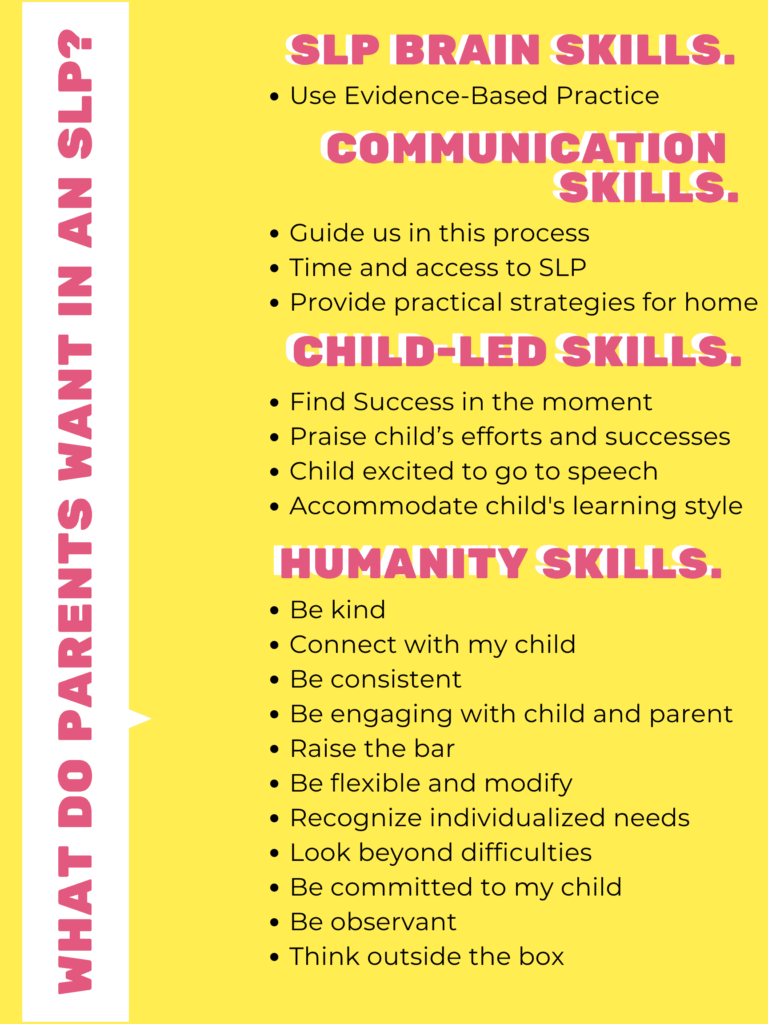Let’s Talk, Parents
Recently, I reached out to the families I have supported in my professional career over the last two decades. I spoke to Anne. I met her son, John, in 2002 when I was in graduate school. I spoke to the families I serve now, too. I asked them two questions. First, what was your goal for speech-language therapy? Second, what are the top three qualities you want/ed in your speech-language pathologist?
I could have assumed the responses to the first question. Families would want to improve their children’s communication, and my assumptions were correct. Ellen said she wanted her son, Thomas, to speak more clearly and gain confidence using his voice. Melody wanted her son, Greyson, to decrease his frustration when communicating his needs with family and caregivers. The responses to my second question, however, were enlightening. What do parents want in a speech-language pathologist? The response may surprise you.
What Parents Want in a Speech-Language Pathologist?
Families could give up to three characteristics or skills. Once families responded, I categorized the responses. I created four categories for the unexpected answers: SLP Brain Skills, Communication Skills, Child-Led Skills and Humanity Skills. Here are the responses:

As I reviewed the responses of my informal survey, I confirmed what I have felt deeply in my SLP gut since seeing my first client in Wisconsin—this field supercedes the basic pillars of communication sciences and disorders. In all of the responses I received, only one parent talked about evidence-based practices. Does this mean that we do not need to consider the research? The answer is an obvious “no.” However, I want you to take note of how many “SLP characteristics” focused on skills outside of speech sound production, language, fluency and voice. So, what do parents want in a speech-language pathologist? A caring human.
Humanity Skills
This is where my project got interesting. Families want someone to connect with their child and lead with their interests in mind. Families want you to communicate with them. Tell them what is happening in speech-language therapy. Fortunately, SLPs, we are in the profession of communicating. Families want you to be flexible. The word “flexible” was written several occasions. This means changing my pre-planned activity to accommodate more child-led activities. This means giving space when my student is having big feelings and eventually letting her know that it’s okay to be angry. This means listening to my student talk about his father who is in jail because it’s important to his days as a 13-year-old.
I know the list of qualities written above is long and complex, and I know that our day-to-day responsibilities are already overwhelming at times. Here is what else I whole-hearted believe, friends. When you first heard quiet whispers of joining this profession, you envisioned making an impact on someone’s communication journey. You made the choice to become a speech-language pathologist. By default, you already possess the qualities desired by our families. I am simply giving you permission to prioritize them. It’s okay to take the time to build relationships and make connections.
Resources
To dive deeper into the topic of family-centered practice, join me in our SLP Impact Community. In our February course, I’ll be focusing on Family-Centered Practice and Speech-Language Pathology. I also speak more in depth on this important topic in Chapter Five of The Heartbeat of Speech-Language Pathology.




If parents want all of this, then vigorous and steady efforts need to be applied to the reduction of caseloads and the demands of frivolous paperwork. It seems no one, not even ASHA, is looking into the demands placed upon speech therapists and increasing caseload sizes. These things rob children and parents of exactly what has been described within this article.
Lori,
You are right on all accounts. It’s surely been more and more challenging for our SLPs carry out their roles and responsibilities in the school setting. While there is no easy answer, at this time, part of this work includes unveiling and acknowledging the challenges, advocating at campus, district and state levels and holding space for SLPs to maintain their own physical, mental and professiona health. I will be the first to say that all aforementioned tasks are difficult to do when time is not a luxury we have. At the heart of your message, Lori, are the students’ needs. Some of us in the field have the priviledge of speaking out and standing up, and I support our colleagues. In the meantime, one of my peers said it best, “Phuong, it’s so hard right now, and I am choosing to just concentrate on my students. They are why I joined this profession.” Thank you for your words, Lori. I am hopeful that change can be made so that we can get back to why we joined this profession in the first place.